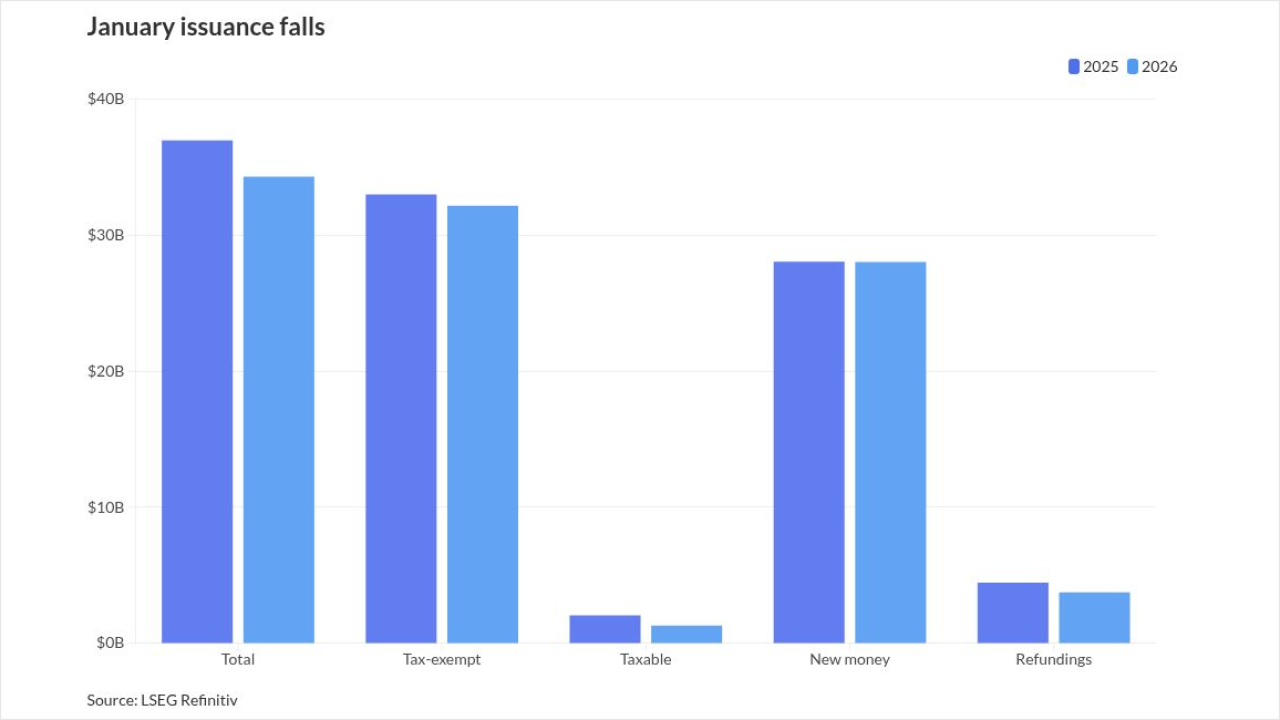
ALAMEDA, Calif. — Voters in California’s statewide primary election on Tuesday will consider more than $1.8 billion of local general obligation bond measures — a relatively small amount by recent standards — with most of the political heat being generated by the race for governor.
There are 22 local bond measures around the state, according to data compiled by Ipreo and Michael Coleman, an expert on California government finance.
It’s a far cry from the last regularly scheduled statewide election, in November 2008, which featured more than $40 billion of bond measures, including $24.8 billion from school districts and other local agencies. More than $35.3 billion was approved.
Much of the attention in next week’s primary is focused on the governor’s race — or at least the race for the Republican nomination between Steve Poizner and Meg Whitman.
The two tech multimillionaires have spent freely in an effort to win the GOP nod in the race to succeed the termed-out Arnold Schwarzenegger.
Statewide elections are often key occasions for school bonds. That’s because the conditions under which a school GO measure can be approved with only 55% of the vote include a provision requiring the election to be held in conjunction with a regular election throughout the district, such as this one. Otherwise, school measures needs a two-thirds vote to pass.
All other local GO bond measures require a two-thirds approval rate in any election, including the largest measure on the ballot Tuesday.
San Francisco is asking voters to authorize $412 million of GO bonds to finance refits and upgrades to police and fire facilities.
The two biggest school bond measures both come from Contra Costa County, east of San Francisco.
The West Contra Costa Unified School District, based in Richmond, is asking voters to approve a $380 million bond authorization, while the Concord-based Mount Diablo Unified School District is seeking $348 million.
For the West Contra Costa district, it’s the fifth time since 1998 it has gone to voters for a GO bond authorization. Voters approved the previous four, authorizing a total of $890 million for the 28,000-student school system.
The local bond elections have drawn relatively little attention amid the free-spending slugfest between the Republican candidates for governor.
Former eBay Inc. chief executive Whitman has raised more than $73 million for her campaign — mostly from her own pockets — through May 22, according to campaign finance reports filed with the secretary of state.
Her foe Poizner, who made his fortune in cellphone technology, reported raising $24.5 million through May 22, also mostly from his own pockets.
To put it into perspective, the combined $97 million the GOP pair reported raising through late May is more than is being requested in the 10 smallest local bond measures combined.
Polls suggest Whitman is the likely winner. She would face Attorney General Jerry Brown, who used his statewide name recognition — earned during his terms as governor from 1975 to 1983 — to freeze out any serious Democratic primary challengers.
All seven statewide constitutional offices are on the ballot.
Treasurer Bill Lockyer, a Democrat, is running for a second term. He doesn’t have a primary challenger, and will face state Sen. Mimi Walters, the only GOP candidate, in November.
Controller John Chiang also has no opposition in the Democratic primary, and is likely to face state Sen. Tony Strickland in November, in a rematch of the
2006 race.
All 80 seats in the Assembly are up this year, as are 20 of the 40 Senate seats, with none of the incumbents seeking another term expected to face a serious primary challenge.
Meanwhile, the dynamics of legislative elections — and also races for Congress and statewide office — would change under Proposition 14.
The measure, one of five statewide propositions, would scrap the current party primary system for state offices and congressional seats, and replace it with a “top-two” primary.
That system would have one primary ballot for everybody, with the top two vote-getters moving on to the November general election, regardless of party.
In other words, the general election may feature two Republicans or two Democrats, especially in districts with lopsided party registration numbers.
Supporters say it will lead to more moderate voices, by forcing candidates to answer to a broad general election audience, rather than the relatively small number of partisans who tend to vote in primaries.
Another ballot measure, Proposition 16, is likely to have a major impact on municipal electric utilities if voters approve it.
The measure would impose a new requirement for public utilities to secure a two-thirds vote in a ballot measure to provide electricity to new customers or establish a community choice electricity program “using public funds or bonds.”
The measure is the handiwork of one business: Pacific Gas & Electric, the San Francisco-based investor-owned utility that serves much of Northern California.
If successful, it would be close to impossible for a municipal utility to annex any PG&E service areas, and exceedingly difficult for any governments to start community-choice aggregation programs. Such programs are authorized under a 2002 state law that allows local agencies to invest in power generation and sell electricity to consumers, while delivering it through the networks of investor-owned utilities like PG&E.
Only one such program, in Marin County, has gotten off the ground so far.
PG&E has spent at least $46 million on the campaign to pass Proposition 16, according to campaign finance records, which has paid for everything from the initial signature-gathering campaign to a massive advertising blitz. There are no other significant contributors to the campaign.





